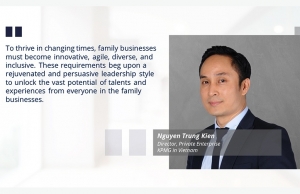Family governance of utmost priority for business success
 |
| It was noted that even family-run businesses require a corporate mindset |
A recent survey conducted by PwC Vietnam shed further light on the situation. The survey, taken from October 2022 to January this year and involving 36 domestic family business owners, revealed that almost two-thirds of Vietnamese family business owners frequently experience conflicts but have not made trust-building between current and future generations a priority.
Only 28 per cent of respondents considered this a significant factor. Moreover, 42 per cent of participants reported a lack of trust between the current and next generations within their families.
Tran Van Thang, director of Assurance Services at PwC Vietnam, noted that family businesses were distinctive in that their members not only worked together but also shared a collective history, values, and vision for the business’s future. Regrettably, these vital aspects are often taken for granted, he added.
When trust is lacking among family members, conflicts easily arise, leading to a lack of cohesion and potential business failures. This may help explain why 64 per cent of survey respondents reported frequent family conflicts in their businesses, significantly surpassing the global average of 30 per cent and the Asia-Pacific average of 29 per cent.
Vuu Le Quyen, director of Biti’s, a prominent consumer goods manufacturing company, has also encountered this challenge since assuming her role in 2018.
“I must confess that I was a square peg in a round hole in my family. I always pushed the boundaries, questioning my parents and challenging the reasons behind their instructions,” she said.
Upon assuming leadership as the next generation, Quyen sought to rectify the misconception that fear is necessary to get the job done, replacing it with the belief that “happiness enables us to accomplish our tasks”.
To ensure the smooth functioning of the family business, she advocated for creating an environment where every member could voice their opinions and be heard. However, she acknowledged that fostering trust among family members had not received adequate attention.
Kao Sieu Luc, CEO of ABC Bakery, said starting a business is difficult, but preserving one’s legacy is even more challenging. He firmly believes that a family business cannot achieve true success without finding a suitable successor.
“For first-generation entrepreneurs like us, transferring power to the second generation is not as simple as delegating authority,” Luc said. “In reality, convincing children who have had the opportunity to study and work abroad, with lucrative salaries, to return to Vietnam and take over the family business is an incredibly challenging task.”
“In the case of my children, I did not leverage my parental authority to force them to come back. Instead, I view them as colleagues, and with colleagues, it is necessary to outline the path of progress, potential, challenges, and the destination clearly and precisely for them to decide what is the right course,” he said.
Kao Huy Phuong, deputy CEO of the company, said that inheriting a family business involved more than maintaining a presence in the domestic market. With a younger generation that travels extensively, engages in continuous learning, and possesses a progressive mindset, expanding the family enterprise into international markets becomes crucial, according to Phuong.
“To successfully penetrate international markets, particularly Japan, I have dedicated considerable time to studying the Japanese language, understanding Japanese culture, and familiarising myself with the stringent regulations of this market,” Phuong said.
She recalled an incident when ABC Bakery exported a batch of pastries to Japan and Japanese authorities discovered an ant on the outer packaging. To determine its origin, they even conducted a DNA test on the ant. Witnessing the meticulousness and thoroughness of their Japanese counterparts made her realise that the pressure on the shoulders of the next generation is no less significant than that faced by the founding generation.
However, Phuong firmly believes that with thorough preparation, the next generation can elevate the family business brand in the international market.
Ng Siew Quan, Asia Pacific Entrepreneurial and Private Business Leader, PwC Singapore shared that in Vietnam, there may be a shorter generational gap compared to other regions.
“This could be the first time that the first generation is transitioning to the next generation in Vietnamese family businesses. The current generation might not have previous experience or a clear understanding of how to navigate this transition, which can lead to suspicion and uncertainty about the right course of action,” Quan said.
Learning from the experiences of other family businesses can provide valuable insights. In Singapore, there is a gradual understanding of the importance of preparing the next generation for succession.
Many family businesses in Singapore ensure that the next generation spends time working in different areas of the family business to gain a comprehensive understanding of the operations, industry, customers, and employees. This process can take several years before the next generation becomes senior leaders within the family business.
“Additionally, it is crucial to prepare the current generation for their post-retirement phase. If they don’t have interests or hobbies outside of the business, they might be reluctant to step down. Encouraging them to explore other activities and develop a life beyond the business can help facilitate a smoother transition,” he told VIR.
| Dr. Peter Bartels - Global Entrepreneurial and Private Business leader PwC Germany
If you see the global data, only 20 per cent of all global family businesses make it to the third generation. Quite often, the reason why they fail is that there are conflicts between the family, the business, and wealth. Family businesses, much like other types of enterprises, encounter various challenges in the business world. Whether they are large corporations or publicly listed companies, these challenges typically involve aspects such as digitisation, workforce preparation, and supply chain optimisation. However, family businesses also face limited resources and a lack of professionalisation. These constraints can hinder the ability to conduct thorough research on foreign markets and determine effective strategies. Beyond the business perspective, family businesses also confront a distinct set of challenges in the familial realm. These challenges encompass three overlapping areas: family dynamics, business operations, and wealth management. Each area carries its own unique considerations and striking a balance can prove complex. Within the family, individuals can choose to be involved in one or more of these realms or concentrate on a specific aspect. For instance, an in-law may focus solely on the wealth component without active engagement in the family or business affairs. I have assisted families by facilitating development of robust governance structures that clarify roles and responsibilities for individuals. Particularly noteworthy is the case of in-laws, whose inclusion transforms them into genuine members of the family. Consequently, their involvement must be carefully considered in both the operational activities and overarching wealth management. Challenges may arise when divisions occur within the family, necessitating the navigation of such situations with tact. Nevertheless, numerous global examples abound, demonstrating the remarkable success of in-laws serving as CEOs in running family businesses. These instances serve as testament to the potential for harmonious integration and collaboration between family and business. |
 | Family businesses: Continuing the future of a legacy KPMG Enterprise, in collaboration with the STEP Project Global Consortium, has conducted an in-depth global survey of nearly 2,500 family business leaders. Following that, a series of roundtable discussions with family business CEOs, academics, and advisers were carried out in February, before the survey report was released in May. |
 | PwC: Family businesses in Vietnam need to transform to build trust Family businesses not only need to make transformative changes to build trust, they have also got to make their efforts visible and communicate them clearly to their stakeholders, according to the Family Business Survey 2023 - Transform to Build Trust by PwC Vietnam. |
What the stars mean:
★ Poor ★ ★ Promising ★★★ Good ★★★★ Very good ★★★★★ Exceptional
Related Contents
Latest News
More News
- IP alterations shape asset strategies for local investors (January 22, 2026 | 10:00)
- 14th National Party Congress: Vietnam - positive factor for peace, sustainable development (January 22, 2026 | 09:46)
- Japanese legislator confident in CPV's role in advancing Vietnam’s growth (January 22, 2026 | 09:30)
- 14th National Party Congress: France-based scholar singles out institutional reform as key breakthrough (January 21, 2026 | 09:59)
- 14th National Party Congress: Promoting OV's role in driving sustainable development (January 20, 2026 | 09:31)
- 14th National Party Congress affirms Party’s leadership role, Vietnam’s right to self-determined development (January 20, 2026 | 09:27)
- Direction ahead for low-carbon development finance in Vietnam (January 14, 2026 | 09:58)
- Vietnam opens arms wide to talent with high-tech nous (December 23, 2025 | 09:00)
- Why global standards matter in digital world (December 18, 2025 | 15:42)
- Opportunities reshaped by disciplined capital aspects (December 08, 2025 | 10:05)


 Tag:
Tag:



















 Mobile Version
Mobile Version